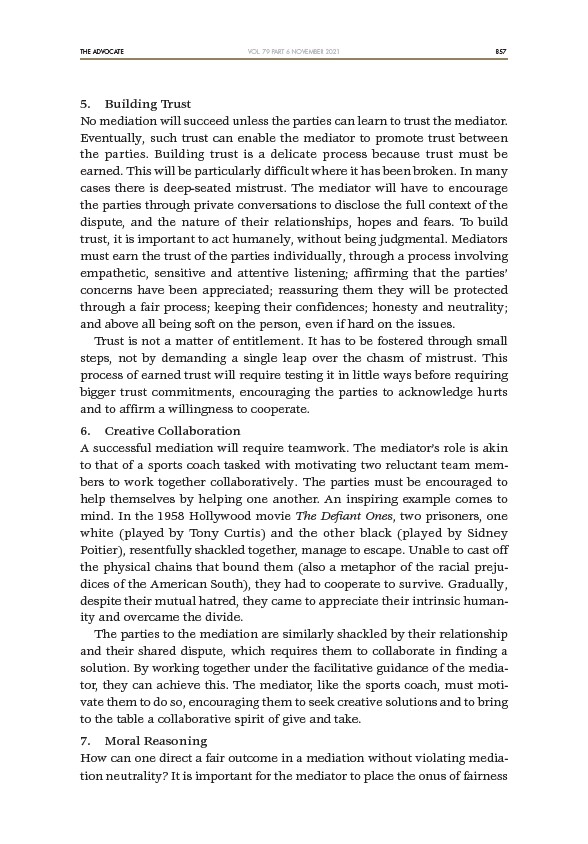
THE ADVOCATE 857
VOL. 79 PART 6 NOVEMBER 2021
5. Building Trust
No mediation will succeed unless the parties can learn to trust the mediator.
Eventually, such trust can enable the mediator to promote trust between
the parties. Building trust is a delicate process because trust must be
earned. This will be particularly difficult where it has been broken. In many
cases there is deep-seated mistrust. The mediator will have to encourage
the parties through private conversations to disclose the full context of the
dispute, and the nature of their relationships, hopes and fears. To build
trust, it is important to act humanely, without being judgmental. Mediators
must earn the trust of the parties individually, through a process involving
empathetic, sensitive and attentive listening; affirming that the parties’
concerns have been appreciated; reassuring them they will be protected
through a fair process; keeping their confidences; honesty and neutrality;
and above all being soft on the person, even if hard on the issues.
Trust is not a matter of entitlement. It has to be fostered through small
steps, not by demanding a single leap over the chasm of mistrust. This
process of earned trust will require testing it in little ways before requiring
bigger trust commitments, encouraging the parties to acknowledge hurts
and to affirm a willingness to cooperate.
6. Creative Collaboration
A successful mediation will require teamwork. The mediator’s role is akin
to that of a sports coach tasked with motivating two reluctant team members
to work together collaboratively. The parties must be encouraged to
help themselves by helping one another. An inspiring example comes to
mind. In the 1958 Hollywood movie The Defiant Ones, two prisoners, one
white (played by Tony Curtis) and the other black (played by Sidney
Poitier), resentfully shackled together, manage to escape. Unable to cast off
the physical chains that bound them (also a metaphor of the racial prejudices
of the American South), they had to cooperate to survive. Gradually,
despite their mutual hatred, they came to appreciate their intrinsic humanity
and overcame the divide.
The parties to the mediation are similarly shackled by their relationship
and their shared dispute, which requires them to collaborate in finding a
solution. By working together under the facilitative guidance of the mediator,
they can achieve this. The mediator, like the sports coach, must motivate
them to do so, encouraging them to seek creative solutions and to bring
to the table a collaborative spirit of give and take.
7. Moral Reasoning
How can one direct a fair outcome in a mediation without violating mediation
neutrality? It is important for the mediator to place the onus of fairness